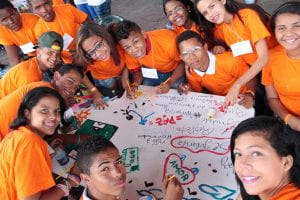According to the United Nations, the Sustainable Development Goals “are the blueprint to achieve a better and more sustainable future for all. They address the global challenges we face, including those related to poverty, inequality, climate change, environmental degradation, peace and justice.” In an attempt to “leave no one behind, the 17 Goals are all interconnected, and it is critically important that we achieve them all by 2030. Also known as Global Goals, the goals were adopted by the UN, and all member states in 2015. Centered around leaving nobody behind, the 17 goals include: no poverty, zero hunger good health & well-being, quality education, gender equality, clean water & sanitation, affordable & clean energy, decent work & economic growth, industry, innovation, & infrastructure, reduced inequities, sustainable cities & communities, responsible consumption & production, climate action, life below water, life on land, peace, justice, & strong institutions and partnerships for the goals.
In order to achieve these goals, the Future We Want Campaign was also created and is targeted towards students K-12, with the hopes that students will become active agents of change in the global environment. I feel like initiatives such as The Future We Want Campaign, are innovative and stand to be very effective in creating a culture of Global Sustainability among youth. These youth are the future leaders of the world. I also think this campaign and call to action place students at a great advantage to not only advocate for sustainable development, but also to serve as catalysts for change.
While this is a refreshing and exceedingly more necessary call to action, this does bring up the question : Why are the Sustainable Development Goals not a topic of discussion in the United States? With the United States as well as the other 192 United Nations member states, adopting the SDGs in 2015, one would think that this commitment would be highly publicized. As a future public health leader of the World and current graduate student of public health, I found it troubling that there is not more discussion of these goals in the academic arena. Aside from information detailing what the goals are, one is hard-pressed to find information that resembles a strategic plan to accomplish the goals as well as a system for measuring progress towards such ambitions. Hopefully however, the Future We Want Campaign will prove successful, and definitive action plans can be created with the input of this often overlooked youth generation.
Further engaging the youth in the development goals may be a key component to achieving them by the year 2030. Possible ways to engage youth might include incorporating the SDGs into national curriculum requirements; this would be done through coordination with the Department of Education (DOE). Similarly, it may be possible to create Federal Programs that would provide youth with the opportunity to engage in Sustainable Development and International Affairs. These may take the form of paid internships exclusive to students K-12. Engaging students in this area may be of interest from a federal standpoint because many of the Sustainable Development Goals align well with the goals of Healthy People 2030.
While currently a Master of Public Health student situated in the City of Atlanta, I think it is important to reflect on the Sustainability Development Goals with Atlanta as the focus. With that said, I feel that Goals 1-3 as well as Goal 11 are the most relevant to the city of Atlanta. I say that because Goals 1 & 2 are “No Poverty and Zero Hunger” and the fact that Atlanta is home to a large underserved and homeless population. The Berean Outreach Ministry Center alone, distributes more than 20,00 pounds of food each week. Not to mention the countless other organizations in the Metro-Atlanta area that share a similar mission. Goal 3 is “Good Health and Well-Being”, and in my opinion health and well-being are in a mutually exclusive relationship with the presence of poverty and hunger. With the constant expansion of the city of Atlanta, I also feel that Goal 11, which is “Sustainable Cities and Communities “should also be of major concern and priority to top officials and decision makers in the city.
I think my role as an MPH student in engaging with the Sustainability Development Goals is firstly, to disseminate appropriate and culturally competent information regarding these goals. This United Nations commitment is not talked about in the U.S., and in order for these goals to be met, the entire global community must be involved. Similarly, I believe it is my role as an MPH student and future public health professional to aid in the creation and implementation of plans to meet the Sustainability Development Goals; whether it be creating a community development plan to achieve goal 10 or helping to implement water filtration devices in communities to help achieve goal 6. It is up to the future leaders of the world to take an active position in creating the future we want.






There are no comments yet...Kick things off by filling out the form below.